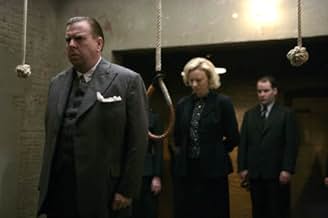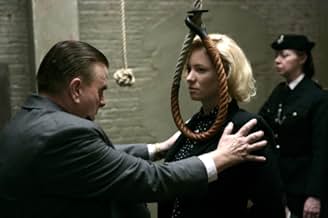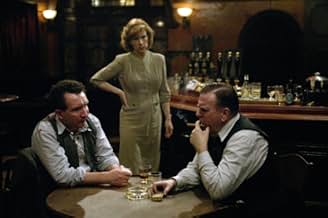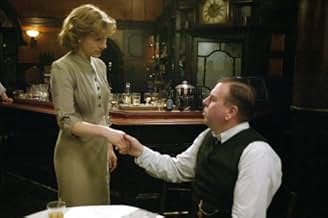CALIFICACIÓN DE IMDb
7.4/10
5.9 k
TU CALIFICACIÓN
Agrega una trama en tu idiomaThe life and times of Albert Pierrepoint - Britain's most prolific hangman.The life and times of Albert Pierrepoint - Britain's most prolific hangman.The life and times of Albert Pierrepoint - Britain's most prolific hangman.
- Nominada a1 premio BAFTA
- 2 premios ganados y 4 nominaciones en total
Lizzie Hopley
- Dorothea Waddingham
- (as Elizabeth Hopley)
- Dirección
- Guionistas
- Todo el elenco y el equipo
- Producción, taquilla y más en IMDbPro
Opiniones destacadas
I saw this DVD twice and read all the other user comments of this recent film before I considered I was ready to write my opinion on IMDb.com.
Capital punishment in the UK was abolished in 1965 and since then it has remained a controversial topic on which MPs have been given a free vote in the House (no whips office involved) and it has consistently been voted down by MPs ever since.The arguments for capital punishment range from "an eye for an eye"; why must the State keep killers alive at the public expense; as an example to other malefactors; to provide revenge for the bereaved families of the murder victim.I suppose the most controversial case cited for reimposing the death penalty stemmed from the Moors Murderers case from 1966, Ian Brady and Myra Hindley who died in custody.Even though they could not judicially be hanged, no Home Secretary since then has considered it politic to release or commute their sentence because of the expected public and media fury.Of course today in Britain killers are routinely sentenced "to life imprisonment" which depending on the circumstances, does not necessarily mean the killer's whole life.
Against this argument is the Christian doctrine of forgiveness and whether the State is executing an innocent man e.g.Timothy Evans (hanged by Pierrepont) instead of John Reginald Halliday Christie for the murder of Evans' baby daughter.
Albert Pierrepoint was certainly not "The Last Hangman" in the UK as I believe he resigned shortly after executing Ruth Ellis in 1955 after a continuous career as Chief hangman stretching from 1933 and as I said above. killers were hanged in the UK right up to 1964.In his 1974 auto- biography he turned against capital punishment with distaste as he considered it was merely the State exacting revenge and solved nothing.Considering he executed 608 murderers we must respect his opinions.I suspect those that advocate execution would not like to do the act personally as long as there is someone else to do it and bear the crushing guilt on their conscience.
Juliet Stevenson gives a marvellously understated performance as Anne Pierrepoint, Albert's wife and provides the home life and comfort to her husband.She is also the business brains in the marriage.We see the chilling, technical efficiency and speed which convinced the Allied powers in 1946 that a British hangman was the best for dispatching the many Nazi war criminals sentenced to death at Nuremburg.Albert was informed by the brigadier that the first batch to be hanged in a day was 13 with many more to come.Albert did not want to know what evil the condemned had done and tried to ensure he kept himself personally and professionally detached when performing his duties for the State.He even had a sense of compassion for the condemned by trying to complete the hanging in less time than his father's average of 13 seconds to reduce the fear and suffering in them.In one notable case he was done in 7 1/2 seconds.Likewise at Nuremburg he decided to hang the condemned female Belsen guards first with the youngest going first as she would be the most frightened.
To my knowledge this is the first film which accurately shows the technical method of hanging that was used in British prisons.It was ignorance by film producers of this that made their films unconvincing when showing a hanging scene as hangmen were advised to keep their methods entirely secret from the public.
All credit must go to Timothy Spall in the central pivotal role and the whole production team in evoking capital punishment in a Britain between 1932- 1955.
Capital punishment in the UK was abolished in 1965 and since then it has remained a controversial topic on which MPs have been given a free vote in the House (no whips office involved) and it has consistently been voted down by MPs ever since.The arguments for capital punishment range from "an eye for an eye"; why must the State keep killers alive at the public expense; as an example to other malefactors; to provide revenge for the bereaved families of the murder victim.I suppose the most controversial case cited for reimposing the death penalty stemmed from the Moors Murderers case from 1966, Ian Brady and Myra Hindley who died in custody.Even though they could not judicially be hanged, no Home Secretary since then has considered it politic to release or commute their sentence because of the expected public and media fury.Of course today in Britain killers are routinely sentenced "to life imprisonment" which depending on the circumstances, does not necessarily mean the killer's whole life.
Against this argument is the Christian doctrine of forgiveness and whether the State is executing an innocent man e.g.Timothy Evans (hanged by Pierrepont) instead of John Reginald Halliday Christie for the murder of Evans' baby daughter.
Albert Pierrepoint was certainly not "The Last Hangman" in the UK as I believe he resigned shortly after executing Ruth Ellis in 1955 after a continuous career as Chief hangman stretching from 1933 and as I said above. killers were hanged in the UK right up to 1964.In his 1974 auto- biography he turned against capital punishment with distaste as he considered it was merely the State exacting revenge and solved nothing.Considering he executed 608 murderers we must respect his opinions.I suspect those that advocate execution would not like to do the act personally as long as there is someone else to do it and bear the crushing guilt on their conscience.
Juliet Stevenson gives a marvellously understated performance as Anne Pierrepoint, Albert's wife and provides the home life and comfort to her husband.She is also the business brains in the marriage.We see the chilling, technical efficiency and speed which convinced the Allied powers in 1946 that a British hangman was the best for dispatching the many Nazi war criminals sentenced to death at Nuremburg.Albert was informed by the brigadier that the first batch to be hanged in a day was 13 with many more to come.Albert did not want to know what evil the condemned had done and tried to ensure he kept himself personally and professionally detached when performing his duties for the State.He even had a sense of compassion for the condemned by trying to complete the hanging in less time than his father's average of 13 seconds to reduce the fear and suffering in them.In one notable case he was done in 7 1/2 seconds.Likewise at Nuremburg he decided to hang the condemned female Belsen guards first with the youngest going first as she would be the most frightened.
To my knowledge this is the first film which accurately shows the technical method of hanging that was used in British prisons.It was ignorance by film producers of this that made their films unconvincing when showing a hanging scene as hangmen were advised to keep their methods entirely secret from the public.
All credit must go to Timothy Spall in the central pivotal role and the whole production team in evoking capital punishment in a Britain between 1932- 1955.
I'd just been through a run of watching many poorly made, uninspiring and disappointing films in the last year, then luckily I saw this film Pierrepoint aka The Last Hangman which restored my faith in cinema.
Like all excellent films, it a simple story, expertly performed by a very strong cast. The other great element of a quality film is that it can be interpreted in many different ways by its viewers.
It shouldn't be explained as a portrayal of a man who hanged people although that is exactly what he did, what made him famous and what he will be remembered for.
For me Pierrepoint is more about working life. The job was always going to be a vocation as his father had been a hangman before him and he wanted to live up to a man he admired. We see the ends that he goes to, to be the best in his chosen field and I must admit I thought this was shown brilliantly; his care, his attention to the task, his desire to see the job done right. In the period of time that this story is set your job was something you took pride in not something you exploited to get better money and benefits while doing as little effort as possible.
It is impossible to be completely accurate when making a biographical film as you are condensing a persons lifetime into a couple of hours of screen time so therefore the director, writers, editor and producers need to shorten, edit and take a certain amount of artistic license.
Fortunately I knew nothing about Albert Pierrepoint before I watched this film so I didn't know what had been left in and left out of this account of his life, since then I talked to my father who knew many things about the man as he had lived and worked in London just after hanging was abolished and had seen Pierrepoint interviewed. He told me about a few things that weren't shown in the film, things that would have given my father an opinion about what type of person this famous hangman was. I've asked my father to see the film as I want to know how the celluloid depiction compares to his memories of the real man; even if he believes it to be inaccurate I'll still watch it again.
It is a dark, sad film which wouldn't be a great date movie but maybe a film you should watch the next time you have a bad day at work.
Like all excellent films, it a simple story, expertly performed by a very strong cast. The other great element of a quality film is that it can be interpreted in many different ways by its viewers.
It shouldn't be explained as a portrayal of a man who hanged people although that is exactly what he did, what made him famous and what he will be remembered for.
For me Pierrepoint is more about working life. The job was always going to be a vocation as his father had been a hangman before him and he wanted to live up to a man he admired. We see the ends that he goes to, to be the best in his chosen field and I must admit I thought this was shown brilliantly; his care, his attention to the task, his desire to see the job done right. In the period of time that this story is set your job was something you took pride in not something you exploited to get better money and benefits while doing as little effort as possible.
It is impossible to be completely accurate when making a biographical film as you are condensing a persons lifetime into a couple of hours of screen time so therefore the director, writers, editor and producers need to shorten, edit and take a certain amount of artistic license.
Fortunately I knew nothing about Albert Pierrepoint before I watched this film so I didn't know what had been left in and left out of this account of his life, since then I talked to my father who knew many things about the man as he had lived and worked in London just after hanging was abolished and had seen Pierrepoint interviewed. He told me about a few things that weren't shown in the film, things that would have given my father an opinion about what type of person this famous hangman was. I've asked my father to see the film as I want to know how the celluloid depiction compares to his memories of the real man; even if he believes it to be inaccurate I'll still watch it again.
It is a dark, sad film which wouldn't be a great date movie but maybe a film you should watch the next time you have a bad day at work.
The movie tells the story of Albert Pierrepoint, Britain's most prolific hangman.
This may sound like the plot of a cheap exploitative movie but I can assure you this is a fantastic movie which respects the man, the profession, the people executed and deals with the conflicts this strange profession carries.
Thimothy Spall, a fantastic and very underrated actor, gives one of the best performances of his career.
I've seen this movie twice before and should definitely see it again.
Highly recommended
Capital punishment in Great Britain was abolished in 1964. Prior to that date there were many Home Office appointed Hangmen, none more prolific than Albert Pierrepoint, who served from 1932 to 1956, during which time he hanged an estimated 433 men and 17 women.
Following his father Henry and uncle, Thomas, into the family 'trade', Pierrepoint became the number one hangman in Britain and his career brought him into contact with many notorious criminals including "Lord Haw-Haw" ("Germany Calling"), real name William Joyce; John George Haigh, the famous "acid bath murderer"; Derek Bentley, still a controversial case and the subject of the 1991 film LET HIM HAVE IT; Ruth Ellis, the last woman to be hanged in Britain, and again the subject of a movie, DANCE WITH A STRANGER (1985); gangster, Antonio "Babe" Mancini; Theodore Schurch, the last person to be executed for treason in Britain. Perhaps the most controversial case in Pierrepoint's career was that of Timothy Evans, whose wife and baby daughter had been found murdered at their home at 10 Rillington Place, also the home of one John Reginald Christie. Evans was executed in 1950. Christie was later charged with the murders of seven women and hanged in 1953. Evans was eventually granted a posthumous pardon in 1966. Evans was played harrowingly by John Hurt in the 1971 movie 10 RILLINGTON PLACE, with Richard Attenborough as a chilling Christie (according to John Hurt on the DVD commentary for 10 RILLINGTON PLACE, Pierrepoint himself actually offered his services, under an assumed name, as technical adviser for the hanging scene in that film as the actual method was covered by the Official Secrets Act and, ever the professional, Pierrepoint wanted it re-creating accurately, and nor would he have wished his work to be misrepresented).
Pierrepoint's body of work (if you'll forgive the expression) was greatly affected by World War II, and he worked all over Europe including Germany, Cyprus, Gibraltar and Austria. It is believed that in 1945 he hanged 190 men and 10 women war criminals at Hameln prison in the British controlled sector of Germany, including Irma Greese, Elizabeth Volkenrath, Juana Boreman and the "Beast of Belsen", Josef Kramer. During the war itself he had assisted his uncle Thomas in the execution of 16 American soldiers, condemned by Court Martial for murder and rape, at a military prison in Somerset. The movie carefully portrays Pierrepoint the man, not Pierrepoint the executioner. When he does his work he leaves Albert Pierrepoint outside. He is totally professional: he doesn't care who they are or what they've done, all that matters to him is that they are human beings who have to die and he will achieve that as quickly and humanely as possible. All that matters to him is height, weight and physical condition. He is also portrayed as compassionate. When organising the order of the hanging of the German war criminals he selects a girl, who has just accused him of doing the Jews work for them, to be hanged first. His army assigned assistant agrees as she's an 'arrogant bitch'. 'No,' says Pierrepoint, 'she's the youngest. She'll be the most frightened.' And after the deed he insists that the remains be treated with due reverence: 'They've paid the price. They're innocent now. D'y'see?' The publicity surrounding the Nazi war criminals disturbs Pierrepoint, as people applaud him in the street and buy him drinks in the newly acquired pub owned by himself and his wife. This isn't right to him. What he does, his job, is private, he does not even discuss it with his wife. All this attention isn't right. Also there is now an ever growing movement opposed to capital punishment. To some he is a national hero, to an increasing number of others he is a murderer. He starts to question his role. Timothy Spall, known as a dry, comedic actor on British TV (AUF WIEDERSEHEN, PET) and usually the slimy, slightly dopey, comic villain in movies like HARRY POTTER and LEMONY SNICKETT, is mesmerising as Pierrepoint. He portrays a quiet, gentle man, and one who regards his profession with honour and pride. He is appointed by the Government; he is the best in the land. His is not to question the law or the decisions of the lawmakers; his is to do his duty to the best of his ability. And he does. Only when his own notoriety, the hanging of his friend and the changing mood of the country toward capital punishment creep into the melting pot, does his resolve start to falter, and only when the various prison authorities start haggling over payments for his services, something he sees as an insult to his position as Chief Executioner, does he consider resigning, which of course he finally does. There are a few historical inaccuracies and inconsistencies (such as the main fact that he was not the last executioner. Capital Punishment continued for another eight years after Pierrepoint's resignation) but this is the norm for this kind of movie, and on the whole the film is as accurate as any film covering over 20 years in 90 minutes. The acting is excellent in all quarters, particularly Juliet Stevenson, though Spall leads by a length. The period is very well captured and is a close cousin to VERA DRAKE in this respect. The main thing about this movie is that it lingers with you and makes you want to think and learn more about its subject. With Pierrepoint's 'clients' having played such a large part in cinema history, it's time we had a movie about the man himself. And this is it. Recommended.
Following his father Henry and uncle, Thomas, into the family 'trade', Pierrepoint became the number one hangman in Britain and his career brought him into contact with many notorious criminals including "Lord Haw-Haw" ("Germany Calling"), real name William Joyce; John George Haigh, the famous "acid bath murderer"; Derek Bentley, still a controversial case and the subject of the 1991 film LET HIM HAVE IT; Ruth Ellis, the last woman to be hanged in Britain, and again the subject of a movie, DANCE WITH A STRANGER (1985); gangster, Antonio "Babe" Mancini; Theodore Schurch, the last person to be executed for treason in Britain. Perhaps the most controversial case in Pierrepoint's career was that of Timothy Evans, whose wife and baby daughter had been found murdered at their home at 10 Rillington Place, also the home of one John Reginald Christie. Evans was executed in 1950. Christie was later charged with the murders of seven women and hanged in 1953. Evans was eventually granted a posthumous pardon in 1966. Evans was played harrowingly by John Hurt in the 1971 movie 10 RILLINGTON PLACE, with Richard Attenborough as a chilling Christie (according to John Hurt on the DVD commentary for 10 RILLINGTON PLACE, Pierrepoint himself actually offered his services, under an assumed name, as technical adviser for the hanging scene in that film as the actual method was covered by the Official Secrets Act and, ever the professional, Pierrepoint wanted it re-creating accurately, and nor would he have wished his work to be misrepresented).
Pierrepoint's body of work (if you'll forgive the expression) was greatly affected by World War II, and he worked all over Europe including Germany, Cyprus, Gibraltar and Austria. It is believed that in 1945 he hanged 190 men and 10 women war criminals at Hameln prison in the British controlled sector of Germany, including Irma Greese, Elizabeth Volkenrath, Juana Boreman and the "Beast of Belsen", Josef Kramer. During the war itself he had assisted his uncle Thomas in the execution of 16 American soldiers, condemned by Court Martial for murder and rape, at a military prison in Somerset. The movie carefully portrays Pierrepoint the man, not Pierrepoint the executioner. When he does his work he leaves Albert Pierrepoint outside. He is totally professional: he doesn't care who they are or what they've done, all that matters to him is that they are human beings who have to die and he will achieve that as quickly and humanely as possible. All that matters to him is height, weight and physical condition. He is also portrayed as compassionate. When organising the order of the hanging of the German war criminals he selects a girl, who has just accused him of doing the Jews work for them, to be hanged first. His army assigned assistant agrees as she's an 'arrogant bitch'. 'No,' says Pierrepoint, 'she's the youngest. She'll be the most frightened.' And after the deed he insists that the remains be treated with due reverence: 'They've paid the price. They're innocent now. D'y'see?' The publicity surrounding the Nazi war criminals disturbs Pierrepoint, as people applaud him in the street and buy him drinks in the newly acquired pub owned by himself and his wife. This isn't right to him. What he does, his job, is private, he does not even discuss it with his wife. All this attention isn't right. Also there is now an ever growing movement opposed to capital punishment. To some he is a national hero, to an increasing number of others he is a murderer. He starts to question his role. Timothy Spall, known as a dry, comedic actor on British TV (AUF WIEDERSEHEN, PET) and usually the slimy, slightly dopey, comic villain in movies like HARRY POTTER and LEMONY SNICKETT, is mesmerising as Pierrepoint. He portrays a quiet, gentle man, and one who regards his profession with honour and pride. He is appointed by the Government; he is the best in the land. His is not to question the law or the decisions of the lawmakers; his is to do his duty to the best of his ability. And he does. Only when his own notoriety, the hanging of his friend and the changing mood of the country toward capital punishment creep into the melting pot, does his resolve start to falter, and only when the various prison authorities start haggling over payments for his services, something he sees as an insult to his position as Chief Executioner, does he consider resigning, which of course he finally does. There are a few historical inaccuracies and inconsistencies (such as the main fact that he was not the last executioner. Capital Punishment continued for another eight years after Pierrepoint's resignation) but this is the norm for this kind of movie, and on the whole the film is as accurate as any film covering over 20 years in 90 minutes. The acting is excellent in all quarters, particularly Juliet Stevenson, though Spall leads by a length. The period is very well captured and is a close cousin to VERA DRAKE in this respect. The main thing about this movie is that it lingers with you and makes you want to think and learn more about its subject. With Pierrepoint's 'clients' having played such a large part in cinema history, it's time we had a movie about the man himself. And this is it. Recommended.
This film details the life and career of Albert Pierrepoint, the Lancashire hangman and owner of the pub 'Help the Poor Struggler' from the 1930s through to the 1960s. His profession is in the blood - following in his father's footsteps - but until the war he stayed anonymous, not even discussing matters with his wife.
Timothy Spall does well in the lead, although the historical accuracy is questionable in places. As a character study it works well, but ultimately it is a fairly depressing watch. The quotation at the end makes clear that Pierrepoint did become disillusioned with his quick and dispassionate job, moving from pride in the speed of his work to the feeling that something is inherently wrong with one person causing another's life to end with deliberate calculation.
Pierrepoint is a film which raises a lot of questions, but ultimately treats them in a superficial way. Historical cases well documented such as Evans and Ellis pass by without much note, which depersonalises them and makes their inclusion something of a lost opportunity.
Timothy Spall does well in the lead, although the historical accuracy is questionable in places. As a character study it works well, but ultimately it is a fairly depressing watch. The quotation at the end makes clear that Pierrepoint did become disillusioned with his quick and dispassionate job, moving from pride in the speed of his work to the feeling that something is inherently wrong with one person causing another's life to end with deliberate calculation.
Pierrepoint is a film which raises a lot of questions, but ultimately treats them in a superficial way. Historical cases well documented such as Evans and Ellis pass by without much note, which depersonalises them and makes their inclusion something of a lost opportunity.
¿Sabías que…?
- TriviaDespite the title Pierrepoint was not Britain's last hangman. He retired in the mid 1950s, shortly after executing Ruth Ellis. Britain never had a "last hangman", as the last two executions before suspension of capital punishment were carried out in different cities at the same time. The last two people executed were both guilty of the murder of John West, so it was decided to carry out the sentence at the same time in Aug 1964. People were still being sentenced to death In November 1965.
- ErroresThe Hamelin war criminal hangings took place in an execution chamber at the end of a cell corridor within the old prison itself, not in an aircraft hangar. Pierrepoint described this very clearly in his memoirs.
- Citas
Albert Pierrepoint: I did a lot of jobs in Germany. More than were really good for me. Too many really. I get so bloody tired now...
- ConexionesFeatured in Adolf Hitler: The Greatest Story Never Told (2013)
- Bandas sonorasMakin' Whoopee
Music by Walter Donaldson
Lyrics by Gus Kahn
Performed by Timothy Spall and Eddie Marsan
Selecciones populares
Inicia sesión para calificar y agrega a la lista de videos para obtener recomendaciones personalizadas
- How long is Pierrepoint: The Last Hangman?Con tecnología de Alexa
Detalles
- Fecha de lanzamiento
- Países de origen
- Idioma
- También se conoce como
- Pierrepoint: The Last Hangman
- Locaciones de filmación
- Productoras
- Ver más créditos de la compañía en IMDbPro
Taquilla
- Total en EE. UU. y Canadá
- USD 23,192
- Fin de semana de estreno en EE. UU. y Canadá
- USD 2,028
- 3 jun 2007
- Total a nivel mundial
- USD 824,856
- Tiempo de ejecución1 hora 30 minutos
- Color
- Mezcla de sonido
- Relación de aspecto
- 1.85 : 1
Contribuir a esta página
Sugiere una edición o agrega el contenido que falta

Principales brechas de datos
By what name was The Last Hangman (2005) officially released in India in English?
Responda

































